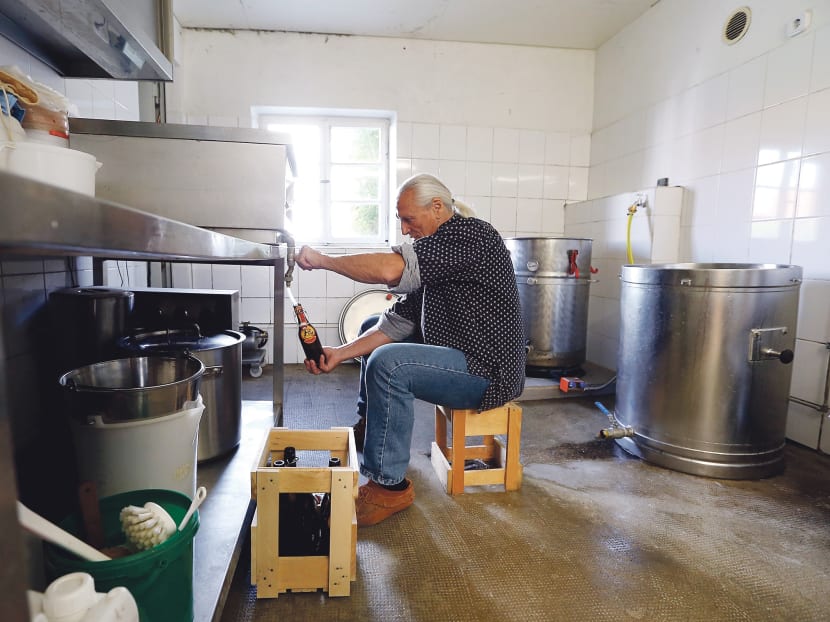Working pensioners offer Germany a boost
FRANKFURT — Given Germany’s low birth rate, more Germans will have to become working pensioners if companies are to avoid the crippling shortage of skilled labour expected in the coming years.

Pensioner Fred Beringer, 70, filling bottles with beer in the southern German village of Schmiechen. Small and medium firms in rural areas of the nation face skill shortages. Photo: Reuters
FRANKFURT — Given Germany’s low birth rate, more Germans will have to become working pensioners if companies are to avoid the crippling shortage of skilled labour expected in the coming years.
At 21 per cent, Germany already has a higher share of its population over the age of 65 than any other country, except Japan.
Despite a large increase in immigration last year, there are already skill shortages in some sectors — particularly in machine building and healthcare, as well as at small and medium companies in rural areas.
However, this is only a harbinger of the difficulties to come when German baby boomers begin retiring over the next 15 to 20 years.
Between 2010 and 2030, the stock of economically active people is set to decline by almost 10 per cent to 39.1 million, said a 2012 report by the Federal Institute for Vocational Education and Training.
The number of economically active people with vocational qualifications is expected to shrink by 19 per cent over that period, in part due to the growing tendency of young people to spurn Germany’s internationally admired system of apprenticeships in favour of going to university.
Not only will the pool of available workers tend to be smaller, but existing employees will also, on average, be older.
Car and truck maker Daimler expects that, in 10 years, half of its employees will be above the age of 50.
Bosch, the Stuttgart-based private technology conglomerate, set up a subsidiary 15 years ago to help retirees rejoin the company to work on special projects.
About 1,600 senior experts worked a total of 50,000 days last year — twice as many as five years ago.
Mr Robert Hanser, managing director of Bosch Management Support, said: “The project manager doesn’t have to explain to senior experts how Bosch works and ticks — they know the culture and are productive from the first hour on the job.”
Germany has made big strides in recent years in retaining older workers in the labour force. The nation boasts the highest employment rate of 63.5 per cent among 55- to 64-year-olds in Europe, bar Sweden.
The proportion of working 60- to 65-year-olds almost doubled between 2002 and 2012, said Germany’s Federal Employment Agency.
This is partly thanks to the buoyant state of the overall labour market and more women joining the workforce. The move to gradually raise the official retirement age to 67 has also helped.
However, Germany owes a debt to corporate efforts to make the working environment more suitable for older workers — from ergonomic production lines and flexible working time arrangements to regular health checks and career-long learning.
Frankfurt airport operator Fraport expects between 25 and 35 per cent of professional and skilled technical employees to leave the company for age reasons by 2025 and, therefore, is focusing on recruiting and training replacements.
As many airport jobs involve lifting and carrying — for example, loading baggage onto planes.
Fraport must also keep a careful eye on employee health as its workforce ages. “Ground traffic services can be very stressful on the body,” said Mr Michael Muller, board member for human resources.
Solutions can be as simple as rotating staff around different functions, so they are not always working to unload goods in the belly of the plane.
By offering flexible working hours, German companies are succeeding in retaining workers who may otherwise struggle to juggle work and family commitments.
At Trumpf, the Ditzingen-based laser-cutting machine maker, employees can opt to work between 15 and 40 hours a week and can adjust this figure every two years.
“The working-time rules we offer are, for many, very attractive. We are an absolute pioneer here,” said Mr Mathias Kammuller, head of the machine tools division.
However, recent policy measures threaten to undermine some of this progress. Germany’s grand coalition has passed legislation permitting staff to retire as early as 63 under certain circumstances.
Mr Stefan Heidbreder, director of the Foundation for Family Businesses, said the policy would worsen the skill shortage, “as people who play an important role supporting business operations will retire, even though companies are counting on them”.
A coalition working group is exploring “flexible pension” policies that would make it easier for people who wish to carry on working after the official retirement age.
Mr Kurt Bock, chief executive of chemical company BASF, urged Germany to make retirement rules less rigid.
“There are many older people who want to do something, who are not happy to retire in their early 60s, who have skills that we need. I think we should support this.”
The Financial Times






